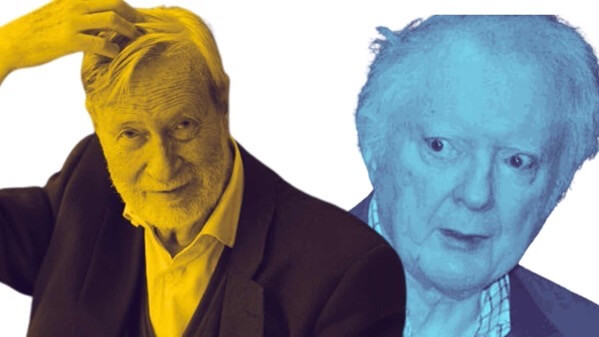The Lost Art of Dissing

When did we forget how to argue well? An old-fashioned skirmish between a scientist and a philosopher is something to miss today.
The philosopher Gianni Vattimo, who recently passed away, is tied to one of the most entertaining and enlightening moments I’ve ever witnessed, and I still miss it. In the late 1990s, I had the privilege of attending a legendary debate between him and physicist Tullio Regge in Turin. The title alone, “Science and Philosophy: Dialogue or Clash?” promised sparks to fly. Regge’s allergy to epistemologists and probably philosophers in general (a condition I think I suffer from as well) was well-known, and the sharp tongues of both speakers, along with their vast knowledge, promised a lightning-fast encounter. We were not disappointed.
On the topic, the two had clearly opposing positions that they vigorously defended. But they were also friends and intellectuals far above the average, so it turned into an unparalleled series of quips, jabs at the intersection of Physics and Philosophy, stories, and semi-mockery. Regge, as a scientist, argued for the fundamental scientific uselessness of his interlocutor, and Vattimo teased him, accusing him of narrow-mindedness.
In a different context, with different people, it could have been a bloodbath because what they said to a less open and intelligent mind could have been offensive. But they had fun, and so did we, and we learned because even the slightest quip was a concentrated dose of reasoning and knowledge that the two explained and shared, even as they continued needling each other mercilessly.
That encounter was a form of high-level dissing. It started with the assumptions of a talk show but worked the other way around, turning controversy into growth, rather than turning reason into a brawl. Even those, like me, who shamelessly rooted for one of the two (and you’ve figured out who it was), could appreciate the fine reasoning of the other, laugh at it, and at the same time learn something.
You could easily imagine the two of them discussing for hours in a Turin café, or on the phone as they apparently often did. For someone like me, who was just starting out as a science journalist, witnessing that debate was an incredibly enlightening example. They managed to bring together people who literally argued on stage but with style and intelligence, resulting in something both fun and instructive for the audience. It’s something I had always believed in but had never seen practiced at that level, at least not in Italy.
Unfortunately, I haven’t seen this approach applied in the years that followed. Not so much because of a lack of capable speakers (who could be found, even though those two were at the top), but because we all breathe a decidedly different and more toxic atmosphere.
Platforms, propaganda, polarization, and social bubbles make it increasingly difficult to argue in a fun and constructive manner. Can you imagine two academics today calling each other useless and ignorant, dragging their entire category of colleagues into it on Twitter? Tarantino could set up a camera and shoot a splatter scene. Perhaps even Regge and Vattimo, if they were to debate on Twitter today, would tell each other to go to hell and ban each other, never speaking again.
Even in real life, it seems like we’ve forgotten how to argue well. There’s palpable fear of a sharp but intelligent clash of views, which risks ruining an evening rather than enriching it. A witty quip, the bait for a healthy diss, is taken as a personal offense. The atmosphere freezes in fear that everything will degenerate in an instant. The level of discussion must always be kept within rhetorical boundaries that don’t upset anyone, within narrow emotional constraints, unbearable and incompatible with intelligent growth, which has always come from some metaphorical, friendly, and non-malicious scratch.
This form of unspoken terror regarding dissing seems to be infecting more and more our work, which should involve useful and well-done confrontation. It infects those who organize scientific debates and festivals, where for some reason, they think that even interesting and civil controversy has no place. Panel members are almost always chosen to tell different pieces of the same story, not to argue with each other.
The few times I’ve been invited to speak and politely offered a slightly contrasting point of view with someone on my panel or participated in an online debate, I’ve felt the disapproving and terrified looks of my colleagues and received messages like “leave it alone, it’ll seem like we don’t get along even among ourselves, and the audience will get confused.”
Confused? But if we remove well-executed controversy, if we untrain people from arguing well, from defending and comparing ideas, all that’s left is the choice between self-referential rambling and the empty and venomous controversy of talk shows. That’s what’s truly confusing. And that’s what’s happening.
In short, I never followed Vattimo particularly closely, and as you’ve understood, when it comes to philosophy, I share the same view as the late Regge.
But today, I’d pay gold to see two people argue as well as they did, with all the expertise, humor, and time it takes to produce something useful. Regge probably didn’t believe in the afterlife, and I didn’t quite understand whether Vattimo did. But if there’s something out there, now that Vattimo is gone, I suppose they’re already insulting each other.